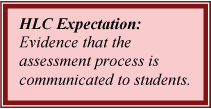Progress Accomplished


Progress: Accomplishments
One of the most valuable aspects of the assessment plan design
is that it requires a yearly evaluation of the assessment system to
be conducted by the Core Team. A recent report on the success of
the 2004-2005 plan implementation and data collection revealed the
following strengths:
The system is taking shape:
- Area and discipline goals and objectives were written.
- The composition of the standing committees was defined and job descriptions for the Core Team and area facilitators were drafted and approved.
- The General Education Competencies were reviewed and streamlined after feedback gained from faculty discussion after the first data collection cycle. A new General Education Philosophy Statement was created and accepted by faculty and administration. The new system of looking at two competencies per year and having all faculty report on those competencies was established to provide better sample sizes. Checklist reporting forms were developed to reflect the faculty's objectives for each competency, which allow for agreed-upon standards for general education.
- The electronic Assessment Folder was created which included the electronic data collection system. Information sessions and workshops were provided to train faculty in the use of the folder and the system.
- The system was organic and allowed enough freedom for faculty to design their own assessment events and instruments. This freed faculty to move at their own pace as their understanding of assessment matured.
- The maturing assessment system has forced the institution to make philosophical changes about how the operations of the College are organized and carried out. It has reduced, to some extent, the perceived isolation of administrative decision-making, by making budgetary and staffing issues part of a data-driven cycle which is informed by faculty.
Faculty and staff are learning about and talking about assessment:
- To guarantee faculty have opportunities for meaningful conversations about assessment, the Wednesday Discussion Hours were created during the activity hour. The schedule ensures full faculty participation.
- Three adjunct workshops have been held in order to explain the system to adjunct faculty and solicit their help in the data collection cycle. Adjunct faculty were surveyed in order to find out what services, training, or support they required in order to complete assessment projects.
- The Assessment Resource Room was created. Resource materials are available for faculty and staff use.
- The assessment newsletter was created and published to keep faculty abreast of upcoming tasks and provide them resources for theory and practice.
Data are being collected and analyzed:
- 100% of full-time faculty participated in the first data collection cycle.
- CAAP data from previous years was analyzed by the full faculty, and ensuing discussion created a new testing administration procedure which assesses incoming freshman and outgoing sophomores. A select population in each cycle receives the same test, thus providing value-added data for the College.

- The student engagement brochure was created for distribution in all classes. The brochure describes how students can take an active role in their own learning, and how the faculty is taking an active role in improving instruction. (See Appendix Q.)
- The Student Services department has taken an active role in introducing students to the process of assessment. In PSY 100, the orientation course, which is required for all students seeking a degree or a certificate, faculty members teach student strategies for getting the most from their education and help students understand the role of learning in setting and achieving goals.







